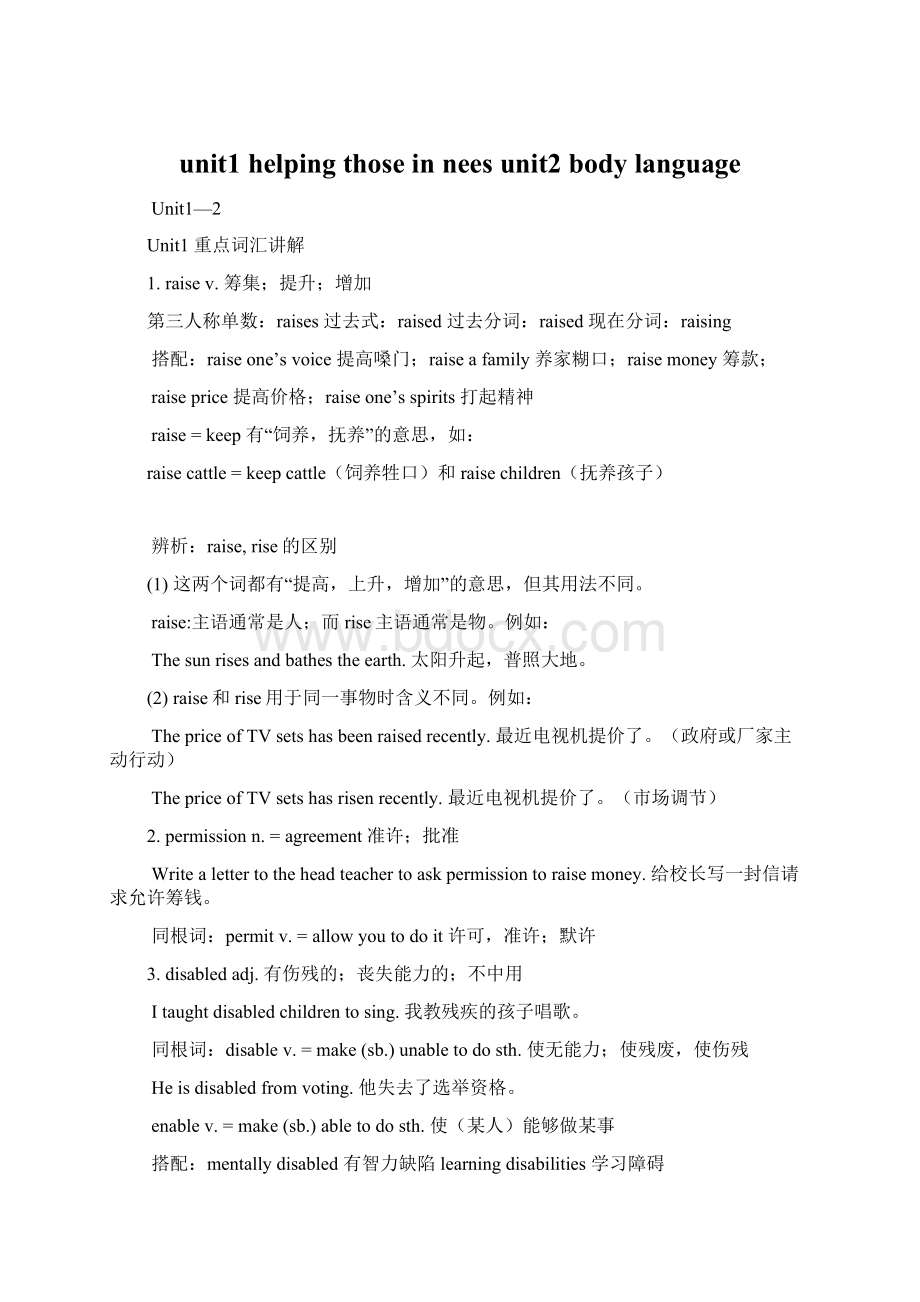unit1 helping those in nees unit2 body language.docx
《unit1 helping those in nees unit2 body language.docx》由会员分享,可在线阅读,更多相关《unit1 helping those in nees unit2 body language.docx(15页珍藏版)》请在冰豆网上搜索。

unit1helpingthoseinneesunit2bodylanguage
Unit1—2
Unit1重点词汇讲解
1.raisev.筹集;提升;增加
第三人称单数:
raises过去式:
raised过去分词:
raised现在分词:
raising
搭配:
raiseone’svoice提高嗓门;raiseafamily养家糊口;raisemoney筹款;
raiseprice提高价格;raiseone’sspirits打起精神
raise=keep有“饲养,抚养”的意思,如:
raisecattle=keepcattle(饲养牲口)和raisechildren(抚养孩子)
辨析:
raise,rise的区别
(1)这两个词都有“提高,上升,增加”的意思,但其用法不同。
raise:
主语通常是人;而rise主语通常是物。
例如:
Thesunrisesandbathestheearth.太阳升起,普照大地。
(2)raise和rise用于同一事物时含义不同。
例如:
ThepriceofTVsetshasbeenraisedrecently.最近电视机提价了。
(政府或厂家主动行动)
ThepriceofTVsetshasrisenrecently.最近电视机提价了。
(市场调节)
2.permissionn.=agreement准许;批准
Writealettertotheheadteachertoaskpermissiontoraisemoney.给校长写一封信请求允许筹钱。
同根词:
permitv.=allowyoutodoit许可,准许;默许
3.disabledadj.有伤残的;丧失能力的;不中用
Itaughtdisabledchildrentosing.我教残疾的孩子唱歌。
同根词:
disablev.=make(sb.)unabletodosth.使无能力;使残废,使伤残
Heisdisabledfromvoting.他失去了选举资格。
enablev.=make(sb.)abletodosth.使(某人)能够做某事
搭配:
mentallydisabled有智力缺陷learningdisabilities学习障碍
4.offerv.=bewillingtodosomething主动提出
Peterofferedtoteachthemwater-skiing.彼得主动提出教他们滑水。
搭配:
offerone’shand伸出友好的手
offersb.sth.为某人提供某物
Theyhaveofferedmealargesumofmoneytogoaway.他们曾为我提供一大笔搬迁费
词组搭配:
provide:
providesb.withsth.或providesth.forsb
offer:
offersb.sth.或offersth.tosb.固定搭配中
Somehowshemanagedtoprovideherchildrenwithfoodandclothing.
她总算设法使她的孩子有饭吃,有衣穿。
Heofferedmeaglassofwine.=Heofferedaglassofwinetome.他端给我一杯酒。
5.illnessn.(某种)病
同根词:
illadj.有病的(比较级:
worse,最高级:
worst)
辨析:
ill,sick的区别:
ill和sick都有“生病的;有病的”之意,但用法并不完全相同。
ill表示“生病的;有病的”这一意思时,一般用作表语,不能作定语;而sick既可以作表语又可以作定语,如“病人”可以说asickman或thesick,但不能说anillman或theill。
例如:
Sheisill/sickinbed.她卧病在床。
Sheislookingafterhersickfather.她在照顾她生病的父亲。
sick有“恶心的;厌倦的”之意。
例如:
Thesmellmakesmesick.这气味使我感到恶心。
ill作定语修饰名词时是“坏的;邪恶的”之意。
例如:
Heisanillman.他是一个邪恶的人。
6.organizev.组织
Intheend,wealldecidedtoorganizeaconcertforEaster.最终,我们一致决定组织一场复活节音乐会。
同根词:
organizationn.组织;机构;团体
7.expressv.表达;表露
Thishelpsthemexpresstheirfeelings.这有助于他们表达他们的情感。
同根词:
expressionn.表现,表示,表达;表情
8.lonelyadj.孤独的;寂寞的;荒凉的(比较级:
lonelier最高级:
loneliest)
辨析:
lonely,alone的区别:
alone为形容词,意为“单独的”,只作表语,不能作定语。
侧重说明独自一人,没有助手或同伴,
没有感情色彩的只表示客观的状态。
lonely意为“孤独的”,表示主观上感到孤独、寂寞,有较浓的感情色彩,指因缺少朋友、同情、友谊等产生的一种悲伤和忧郁的感情。
它为形容词,在句中作表语或定语。
作定语时,意为“荒凉;偏僻”,多修饰表示地点的名词。
alone还可以作副词。
aloneadv.单独;独自
Shewenthomealone.=Shewenthomebyherself.她独自回家去了。
Theoldmanlivesinalonelytown,helivesalonebuthedoes’tfeellonely.
9.friendshipn.友情;友谊
同根词:
friendn.朋友复数:
friends.
friendlyadj.友好的
Roberthasafriendlyrelationshipwithhiscustomers.罗伯特和他的客户之间关系处得很好。
friendlinessn.友善
Shealsolovesthefriendlinessofthepeople.她也喜欢人们的友善。
10.difficultyn.=benotabletodosomethingeasily困难;费劲
Thecountryisfacinggreateconomicdifficulties.该国正面临巨大的经济困难。
同根词:
difficultadj.=hardtodo困难的
Thechildisgoingthroughadifficultphase.那孩子正经历困难的阶段。
搭配:
havedifficulty(in)doingsomething做……有困难
Ihadnodifficulty(in)makingmyselfunderstood.我毫不费力地表达了自己的意思。
indifficulty/difficulties处境困难
Thebankisindifficulty/difficulties.这家银行处境困难。
11.joyn.=afeelingofgreathappiness愉快;喜悦
同根词:
joyfuln.快乐的,高兴的;令人开心的,使人喜悦的
Hewasexcitedandjoyfulatthesuccess.他因成功而激动欣喜。
搭配:
toone’sjoy令人高兴的是,使某人高兴的是
Toherjoy,hersonwaspermittedtoakeyuniversity.
12.peacen.平静;宁静
theNobelPeacePrize诺贝尔和平奖
同根词:
peacefuladj.和平的;爱好和平的;安静的;平静的
Eveninginthecountryisaverypeacefultime.乡村里的今晚是平静安谧的时刻。
13.hurtv.=injure使疼痛;受伤
Timhurthislegsinanaccident,buthehaslotsofcourage.
提姆在一次事故中伤了腿,但他很勇敢。
同根词:
hurtadj.受伤的;痛苦的;(受)损坏的
Theydidnotseemtobebadlyhurt.他们看起来没有受重伤。
搭配:
hurtoneself受伤
Haveyouhurtyourself?
你伤着自己了吗?
14.couragen.勇气;勇敢
Heshowedgreatcourageanddetermination.他表现得十分勇敢和果断。
同根词:
encouragev.鼓励,鼓舞;支持;促进;鼓动
MyEnglishteacheroftenencouragesustoreadEnglishaloud.
15.payv.付款;偿还
Wepaid₤35foreachticket.我们每张票付了35英镑。
同根词:
payn.工资;薪水;报答
Theycomplainedabouttheirpayandconditions.他们抱怨他们的薪水和工作条件。
搭配:
payoff偿清(债务);支付(债务)的全部数额
payattentionto注意payavisitto去参观,拜访payfor为……付款
辨析:
spend,take,cost和pay的用法区别:
take,spend,cost,pay都可以表示“花费”,但用法却不尽相同。
spend的主语必须是人,常用于以下结构:
(1)spendtime/moneyonsth.在……上花费时间(金钱)。
例如:
Ispenttwohoursonthismathsproblem.这道数学题花了我两个小时。
(2)spendtime/money(in)doingsth.花费时间(金钱)做某事。
例如:
Theyspenttwoyears(in)buildingthisbridge.造这座桥花了他们两年时间。
cost的主语是物或某种活动,还可以表示“值”,常见用法如下:
(1)sth.costs(sb.)+金钱,某物花了(某人)多少钱。
例如:
Anewcomputercostsalotofmoney.
(2)(doing)sth.costs(sb.)+时间,某物(做某事)花了(某人)多少时间。
例如:
Rememberingthesenewwordscosthimalotoftime.他花了大量时间才记住了这些单词。
注意:
cost的过去式及过去分词都是cost,并且不能用于被动句。
take后面常跟双宾语,常见用法有以下几种:
(1)Ittakessb.+时间+todosth.做某事花了某人多少时间。
例如:
Ittookthemthreeyearstobuildthisroad.他们用三年时间修完了这条路。
(2)doingsth.takessb.+时间,做某事花了某人多少时间。
例如:
Repairingthiscartookhimthewholeafternoon.他花了一下午修车。
Unit2重点词汇讲解
1.communicationn.交流;交际
Languageisthemostimportanttoolincommunication.语言是最重要的交际工具。
communicatev.交流;交际一般和with连用
wehavenevercommunicatedsincewegraduated.毕业后我们就再也没有联系过。
2.acceptv.接受(建议、邀请等)&receive作比较
accept表示“接受(建议、邀请等)”时,可作及物动词或不及物动词。
如:
sheofferedhimaliftandheacceptedit.他请他搭她的便车,他领情了。
Heaskedhertomarryhimandsheaccepted.他向她求婚,她同意了。
acceptancen.接受;接纳
3.rejectv.拒绝接受;不予考虑rejectionn.拒绝
Thechiefeditorrejectedhissuggestion.主编拒绝了他的建议。
4.meaningn.意义;意思
Icannotunderstandthemeaningsofthesesymbols.我无法理解这些符号的含义。
meanv.意思是…meaningfuladj.有意义的
5.boredadj.(对某人、某物)厌倦的;烦闷的
Iamgettingveryboredwiththismatter.我开始对这件事感到非常厌倦。
比较bored与boring
二者都是形容词,但bored是指人感到厌烦,而boring是指事情本身无趣。
当形容人的想法感受是用bored,描述事物给人的感受时用boring.类似于interested与interesting.
Thebookisveryboring,soIfeelbored.这本书很无聊,因此我对它毫无兴趣。
borev.令人厌烦boredomn.厌烦;无聊
6.part-timeadj兼职的
Part-timeworkisgenerallyhardtofind.一般来说,兼职工作很难找。
I’mpart-time.Iworkthreedaysaweek.我做兼职,每周工作三天。
7.well-dressedadj.衣着入时的;装着讲究的
Asanofficelady,sheisalwayswell-dressed.作为一名办公室女职员,她总是衣着得体。
8.mattern.(询问某人的情况)怎么了
What’sthematterwithyouroffice?
你们办公室出了什么事?
Shetoldhimtherewasnothingthematter.她告诉他没出什么事。
matterv.有关;要紧;有影响
Mostofthefooddroppedonthefloorbutthatdoesn’tmatter.
食物大都掉在地板上了,不过也没什么关系。
9.expressionn.表情;神色
Hesaidnothing,buthisfacialexpressiontolduseverything.
他什么也没说,但他的面部表情却透露了一切。
expressv.表达;表示
10.appearancen.外貌;外表
Weshouldnotjudgepeoplebytheirappearance.我们不应以貌取人。
appearv.出现
11.holdv.(held,held)使保持(在某位置)
Holdyourhandsinfrontofyourface.把双手举在面前。
Holdthisquestionforfiveminutes,anditwillexerciseyourwaist.
保持这个姿势五分钟,它会锻炼你的腰部。
hold还有如下的常见释义和用法:
(1)拿着;握住;托住:
Sheisholdingherdiaryandapen.她手里拿着日日记本和一支钢笔。
(2)进行;举行:
TheOlympicGamesareheldeveryfouryears.奥运会每四年举办一次。
(3)保留;保存WecanholdyourreservationuntilnextTuesday.您的预订我们会保留至下周二。
(4)能容纳:
OneCD-ROMcanholdover100,000pagesoftext.
一张只读光盘可以储存十万多页的文字资料。
12.remindv.使醒;使想起
RemindmetobuyGrandpaanewspaperonmywayhome.提醒我在回家的路上给爷爷买份报纸。
remind是个及物动词它主要有以下几种用法:
(1)remindsbof/aboutsth提醒某人某事。
如:
Iwant toremindyouof/abouttherulesforschoolparties.
关于学校聚会,有几项规定我想提醒以下你们
(2)remindsbtodosth提醒某人做某事。
如:
Pleaseremindmetoposttheletteronmywaytotheschool.
请提醒我在上学的路上把这封信寄了。
remindsb后接that从句表示“提醒某人(去做)某事”。
如:
Wouldyouremindhimthatourmeetinghasbeenputoff?
请告诉他我们的会议推迟了好吗?
13.crossv.使交叉;使重叠crossingn.十字路口
Don’tcrossyourlegswhenyousit.别翘着腿坐着。
Thebosscrossedhisarmsandwatchedus.老板交叉着胳膊看着我们。
提示:
动词cross还有如下常见的释义及用法:
(1)穿越;越过;横过;渡过:
In1838thefirstironshipcrossedtheAtlantic.
1838年,第一艘铁制帆船横渡大西洋。
(2)交叉;相交:
Theroadscrossjustoutsidethetown.这些道路正好在城外交叉。
crossprep.穿过;在对面n.十字形;十字架adj.生气的
cross&across作比较
14.shakev.(shook,shaken)(与某人)握手;摇头
Peopleoftenshakehandswhentheymeet.人们见面时常会互相握手。
Bobshookhisheadtoshowdisagreement.鲍勃摇头表示反对。
短语
1.situp坐起来;坐直
situp除了表示“坐起来;坐直”的意思外,还有“熬夜”之意。
如:
Herheadspinsassoonasshesitsup.她一坐起身就感到天旋地转。
Wesatupdrinkingandtalking.我们饮酒聊天,直至深夜。
2.ShelookedatDebbieandSimon,andthenwalkedovertoDebbie.
walkoverto意为“走到;径直走向;走到….去”。
如:
IwalkedovertoJimandgavehimmycongratulations.我走过去向吉姆表示了祝贺。
3.Debbiegaveheracheerfulgreeting.戴比热情的文问候了她。
gavesbagreeting意为“问候某人”,相当于greetingsb.
gavesbacheerfulgreeting意为“热情地问候某人”,又如:
4.Simonsighedandwalkedaway.西蒙叹了口气,走开了。
walkaway意为“转身离开;走开”。
如:
Hewalkedawaysadlyandthoughtofthewaytosolvetheproblem.
5.“What’sthematter?
”Mr.Yangasked.“怎么了?
”杨先生问到。
What’sthematter?
常用于提问“怎么了?
”,用来表示对他人的关心。
如:
--What’sthematter?
怎么了?
--Myleghurts.我腿痛。
当具体询问某人或某物的情况时,后可接withsb/sth.如:
What’sthematterwithyou,Simon?
西蒙,你怎么了?
6..peoplealwayschooseDebbieinsteadofme.客人们总是选戴比而不选我。
insteadof的意思是“代替…”,后面常跟名词、代词或动名词。
如:
Ihavecomeinsteadofmyelderbrother.Heisill.我是代替我哥哥来的。
他病了。
(后接名词)
Iwillgoinsteadofyou.我会代替你去的。
(后接代词)
Insteadoflendingahand,helaughedatus.他不仅没有帮我们一把,反而嘲笑我们。
(后接动名词)
注意:
instead单独使用的时候是副词,常用于句末,也可用于句首。
如:
Wedidn’tgotherebycar.Instead,wetookaplane.我们没有坐车去哪里,而是坐了飞机。
另外,使用instead的句子可以改写成insteadof的句子。
insteadof如:
Sheneverstudies.Instead,sheplaystennisallday.
=
7.It’sthewayyoucommunicate.那是(因为)你的沟通方式。
theway后跟一个句子,用于修饰way我们称之为定语从句。
又如:
Idon’tlikethewayyoudealtwiththis.我不喜欢你处理这件事的方式。
8.Communicateismorethanjustspeaking.沟通不仅仅只是说话。
“…bemorethan…”的结构常用于表达“不只是;不仅仅是”的意思。
有如:
Nancyismorethanjustacolleaguetoher.Sherega